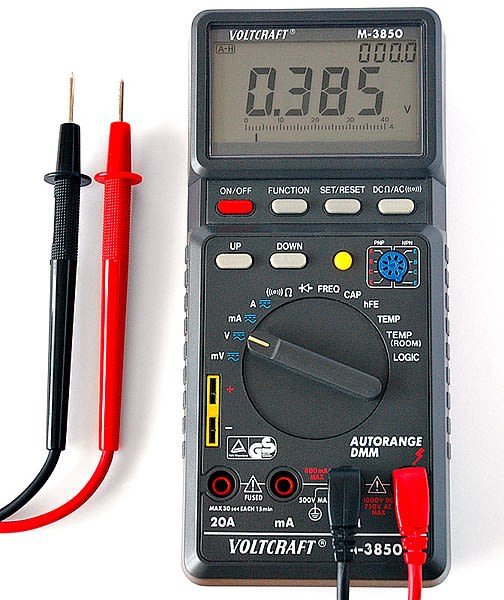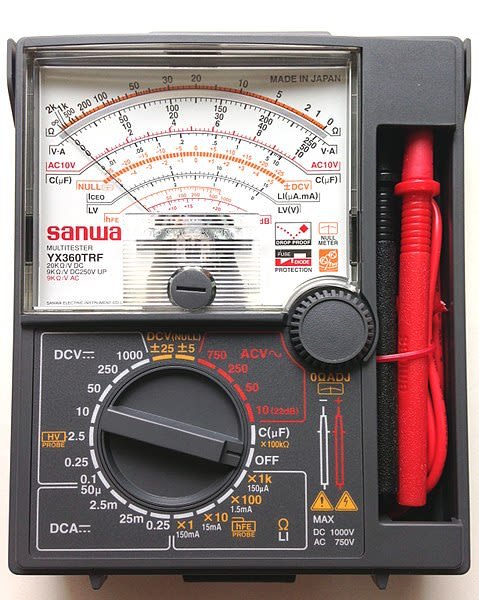Analogue or Digital Multimeter, Which Should I Choose? A Beginners' Guide To The Multimeter #2
In my previous article on multi-meter. I have explained explicitly the multi-meter and the convenience its evolution provided for engineers. You can read it up [here](https://www.steemstem.io/#!/@ikchris/understanding-the-mu-1551017137). You can scroll further for the summary
*Decades ago, Engineers have to troubleshoot/work with at least three different meters (ohmmeter, ammeter and voltmeter) at the same time, this was so burdensome as interchanging between different meters require some bending and standing exercise.
However, with advancement in technology ensued the evolution of the multi-meter; an electronic device that combines both voltmeter, ammeter and ohmmeter in one gadget.
Multi-meters work with different principles, but the one commonly seen work with three distinct principles: force in a current carrying conductor, magnetic field due to a current carrying conductor and Hooke's law of elasticity on spring.*
Introduction
Many atimes, beginners find it complex and confusing to choose between the digital multi-meter and the analogue multimeter. Some would go to the extent of using google to research on it but end up being confused the more. Whether digital multi-meter or analogue multimeter, the two can be used to measure basically three electrical quantities which are resistance, current through a conductor or circuit, ant the potential difference across two terminals.However, some certain factors might influence your selection between the digital multi-meter and analogue multi-meter. Whichever one is preferred, the two have a similar knob for selection. the same way you turned the knob to select resistance measurement, voltage measurement or current measurement in analogue multi meter is also applicable to the digital multi-meter.
Factors To Consider Before Buying A Multi-meter
Some years of my practice of troubleshooting electronic device and maintenance of electrical equipment and wiring, I have used both the digital multi-meter and it analogue counterpart. So am not in the wrong position to numerate the factors you should consider before selecting between buying the digital multi-meter and the analogue multi-meter.1. Ease Of Taking Records
Firstly, if you are having any eye problem (be it nearsightedness, farsightedness or any other), do not consider buying analogue multi-meter; else you have to walk about with your medicated glasses while using your analogue multi-meter.The display of digital multi-meter is sharply different from that of its analogue counterpart. Th digital multi-meter display is discrete in values (it displays a definite value for range of value; e.g it might display 5 for values ranging from 4.958-5.025) while the analogue has a needle deflecting in a non-uniform calibrated scale, the analogue is continious in values(this means the needle keeps deflecting correspondingly to any change in the electrical quantity being measured)

source:[Wikimedia]( )||license:[CC by SA 2.5](creativecommons.org.org)
)||license:[CC by SA 2.5](creativecommons.org.org)
Assuming you want to measure resistance with the digital multi-meter, you just need to connect the probe wires to the terminals of the resistor and record the numbers displayed on the screen. But that of the analogue multi-meter becomes complex; you have to first learn the scale_ more complex is the fact that the scale is not uniform, the distance of deflection is neither directly proportional or indirectly proportional to the magnitude of the resistance being measured. Assuming in measuring a 100-ohms resistor, the circular distance of the needle's deflection is 3cm, the defection of a 1Kohms resistor should be 30cm if directly proportional or even 0.3cm is it is inversely proportional; but it is none of these. It is different entirely which means being able to read the scale for a 100Ω resistance does not guarantee you could read that of 2KΩ resistance.

source:[wikimedia](https://commons.wikimedia.org/wiki/File:YX360TRF(Sanwa).JPG)|| license: [CC by SA 3.0](creativecommons.org)
A careful look at the image above, you would observe a non-uniform scale. on the Ω-scale, which is the first scale on th analogue meter. The circular distance between 0-5Ω and 5-10Ω is not same. Similar thing applies between 50-100Ω and 100-200Ω.So each segment has its own unique scaling. To use analogue meter, you have to learn the corresponding scale anytime you want to take record.
Error Due To Parallax
Error might arise while taking readings. Taking record from a scale, you have to look directly to the scale at angle 90° . for some humans this is very difficult if not impossible; looking from an angle different from 90° , you might read 5.2volts what is actually 5volts, a very small voltage difference matters in electronics. Maximum concentration is needed while using analogue meter. their is a high probability(probability close to 1, that people suffering from any eye defect will commit error due to parallax while taking reading from calibrated scalesSensitivity
Sensitivity is the ability of the multi-meter to detect the slightest change in the electrical quantity being measured. Lets assume we are to measure alternating voltage across terminals, most times, the magnitude of alternating voltage fluctuates. The digital meter will also display a discrete values amidst the fluctuation in voltage. The analogue meter and digital meter would detect the **slightest** change on the voltage being measured and its needle will deflect correspondingly and also the screen of the digital meter respectivelySo if you want to measure any electrical quantity and sensitivity is your priority; you can choose either the analogue or digital multimeter . For troubleshooting of complex circuitry, using analogue multi-meter should be considered.
Troubleshooting a faulty capacitor using voltage method is best done with analogue meter. Using a digital multimeter will display a discrete value for the voltage across terminals of the capacitor, this might deceive you into thinking the capacitor is still in normal condition. But using the analogue meter, you would see how the voltage in the capacitor is fluctuating. One thing unique to some faulty capacitors is that the voltage across it fluctuates.
Accuracy
Accuracy of measuring instruments(e.g multimeter) is the proximity or closeness of the value/magnitude detected(displayed either by screen or needle's deflection) by the measuring instrument to the actual value. Let's assume we are to measure resistance which value is 15.12 Ω, the multi-meter might display or deflect it as 15Ω. So the closer the measurement of the multi-meter to the actual value of the electrical quantity being measure, the higher we say is the accuracy.In comparing the digital and analogue multimeter of the same price range and spec, the analogue has more accuracy than the digital multi-meter.
Cost Factor
For a digital and analogue multi-meter in the same class, the digital multi-meter is more expensive(at least in markets here in Nigeria). So if you are looking for an economical multimeter, opt for the analogue multimeter.
Extra Added Features
Most digital multimeter can only measure the three basic electrical quantities(current, voltage and resistance) but digital multi-meters have some extra added features like capacitance measurement and the ability to troubleshoot both PNP and NPN transistors; this is possible through some extra ports like CX(capacitance channel), PNP and NPN(transistors channel) incorporated in it. An internal extra circuitry is added in the digital meter to aid the extra ports function
Finally, in my recommendation, I would suggest you buy the analogue meter so you can learn the scale. If you can operate the analogue meter, the digital would become so easy to you to operate.
Conclusion
The main function of the multimeter(be it digital or analogue) is to measure electrical quantities. I have explained some factors you should consider before acquiring a new multimeter as a beginner. However, I still do not rule out the fact that individual differences influence our preferences, some other persons might recommend the digital multi-meter for a start.
References
* [The non-linear scale of an analogue multimeter](https://www.sciencedirect.com/science/article/pii/026288569599716E)* [Sensitivity of analogue and digital multimeter](https://en.wikipedia.org/wiki/Multimeter)
* [Accuracy of measuring instruments](https://elsmar.com/elsmarqualityforum/threads/comparing-the-accuracy-of-analog-vs-digital-multimeter.34923/)
* [Accuracy and precision of measuring instruments](https://en.wikipedia.org/wiki/Accuracy_and_precision)
* [Parallax error in taking readings from a scale](https://en.wikipedia.org/wiki/Parallax)
This post has been voted on by the SteemSTEM curation team and voting trail in collaboration with @curie.
If you appreciate the work we are doing then consider voting both projects for witness by selecting stem.witness and curie!
For additional information please join us on the SteemSTEM discord and to get to know the rest of the community!
Congratulations @ikchris! You have completed the following achievement on the Steem blockchain and have been rewarded with new badge(s) :
Click here to view your Board
If you no longer want to receive notifications, reply to this comment with the word
STOPTo support your work, I also upvoted your post!
Do not miss the last post from @steemitboard:
Vote for @Steemitboard as a witness and get one more award and increased upvotes!
First I'd like to commend you on the pretty comprehensive work you've done here. I see you are a big fan of the analogue multimeters but there a few points I respectfully beg to disagree on.
I am afraid I have to disagree that an analogue meter of the same quality of its digital counterpart is in any way more sensitive. A digital meter can be precise to four decimal places and more. E.g. how can you tell a voltage of a battery is 12.2305V if you measure with an analogue meter?
Again I cannot entirely agree with the above. If analogue meters are that good, the majority of modern measuring instrument won't have a digital meter display; instead, they will still be in the analogue era.
I do agree with this one, part of the reason we are moving away from the analogue era to digital.
Keep on contributing to the steem community we do appreciate every one of us that do. Thank you.
Thanks for your time. If we are t measure ACV, the digital multimeter would nt show the fluctuations of the voltage being measured but the analogue would show it via a corresponding deflection.
Truly, the analogue cannot measure voltage in 3 decimals. Thanks for your enlightenment
Again I'd say you'd see fluctuations on the digital display as the voltage value rapidly changes.
Take a look at these fluctuations of voltage after a storm.
You can even tell the range of change of values which I think in this case is between 84V to 195.7V
Thanks for the video. Could it be that this particular meter is more sensitive than mine?
Well, in all fairness I do not know how sensitive either this or your meter is. But I can only say that most run-of-the-mill digital meter behaves the same way like the one in this video.
Thanks. I have made some corrections
That's awesome :)